仁爱版英语八年级下册教材同步详解
仁爱英语八年级下册教材分析53026

仁爱英语八年级下册教材分析53026仁爱英语八年级下册课程说明书Unit5 Feeling Excited本单元的三个话题仅仅围绕情感这个主题展开。
第一话题You look excited通过Kangkang, Maria, Jane和Michael四个同学谈论话题《音乐之声》谈话自然地引出了高兴和快乐、失望和遗憾的情感。
第二话题:I feel better now. 由Li Hong 的哭泣引出伤心的情感,进而由教师的出现引出安慰及建议等用语。
第三话题:Many things can affect our feelings. 围绕Michael 的病情引出事物对情感的影响。
本单元主要以活动的形式,联系实际生活,把英语教学和情感教育有机地结合起来。
Topic1 you look excited?这个话题通过同学们对话,呈现了孩子们的高兴和王老师因没买到票而感到失望和遗憾,进而引出各种情感,集中体现了有关情感的形容词及一些短语。
在这个话题中,你将会如何表达自己的情感,如何描述自己或他人的情感,还可以了解一些戏剧和电影等方面的相关知识。
主要句型:You look excited.Please say thanks to your mom.Why all the smiling faces?What’s the matter with Mr. Wang?He feels disappointed….It’s so funny and interesting.Did she sound upset?I’ll ring up Michael later.Topic2 I feel better now.这个话题由Li Hong的哭泣引出伤心的情感,进而由教师的出现引出安慰和建议的用语;并且集中呈现了有关个性的形容词,以及培养和激发学生的自信心等有关的内容。
语法主要是原因状语从句以及形容词同级比较。
主要句型:She feels very lonely because she has no friends to talk with.I thought the roads here were not as clean as those in our hometown.Helen is as lovely as Maria.Topic3 Many things can affect our feelings.本话题围绕Michael的病情继续学习和掌握关于情感的用语,巩固前面的语言知识,进而引出一些事物对情感的影响,比如颜色、天气、月亮、环境等。
仁爱版英语八年级下册教材同步详解

.em tpecca t’nod set amssalc ym taht smees ti ,erom s’tahW�且而�外此 erom s’tahW .2 箭似阴光 !seilf emit woH .1 C noitceS
�如�首句或末句在放常�词接不后�词副� ”替代“表 daetsni )1( .2 �tpecca 为词义反的 esufer� 事某做去绝拒 .hts od ot esufer .sdneirf sih htiw seivom eht ot og ro reccos yalp ot desufer eH .1 D noitceS .sgod fo diarfa ma I :事某�做�怕害 .hts )gniod ( fo diarfa eb .cilbup ni gnikaeps fo diarfa si lrig ehT .3
康健很 htlaeh doog ni eb �情心坏/好于处 doom dab / doog a ni eb .reihtlaeh emoceb yam ew ,doom doog a ni yllausu era ew fI .1 B noitceS .hsilgnE flesym hcaet I = .flesym yb hsilgnE nrael I�如 …学自 ).hts( fleseno hcaet = fleseno yb )hts( nrael /yduts 学自以可你 .flesruoy yb yduts nac uoY .6 .moorssalc eht naelc ot snrut ekat eW�事某做去流轮.hts od ot snrut ekat .snossel ruoy htiw uoy pleh ot snrut ekat nac eW .5
仁爱版八年级英语下册各单元知识点梳理汇总(全册-经典-共12页),推荐文档

Un it 5 Topic 1 You look excited【重点词组】1. in vite sb. to do sth.邀请某人做某事2.o ne of +形容词最高级+名词复数3. say tha nks/hello/sorry/good-bye to sb. 向某人致谢/问好/道歉/告别4. feel/taste/smell/look/so un d/seem +adj.5. seem to do sth.seem+adj.it seems that+ 从句7. a ticket for/to sth.一张……的票8. lonely adj.孤独的alone adj./adv.独自的,一个人的9. because of+n ./pro n/v-i ng10. cheer sb. up使某人振作起来11. care for =take care of = look after照顾12. come into being 形成,产生13. be full of = be filled with充满……14. agree with sb.同意某人15. make peace with sb.与某人和平相处16. in the end =at last = fin ally 最后,最终17. be popular with sb.受某人欢迎[词形变化]1.invite v.邀请invitation n.邀请2. disappionted adj.失望的,沮丧的disappointment n.失望,沮丧disappointv.使失望3. excite v.使激动,使兴奋Un it 5 Topic 2 I ' m feeli ng better now.【重点短语】1. do badly in=be bad at在某方面做的差2. be strict with sb.对某人要求严格3. have a talk with sb.excited adj.兴奋的,激动的(修饰人)exciting adj.令人兴奋的,使人激动的(修饰物)4. m ain adj.主要的mainly adv. 主要地5. face n.脸,面部facial adj.面部的6. worry v.担心worried adj.担心的,担忧的[重点句型]1. --How are you doin g? 你好吗?--Very well.非常好。
仁爱版英语八下Topic2_教材知识详解
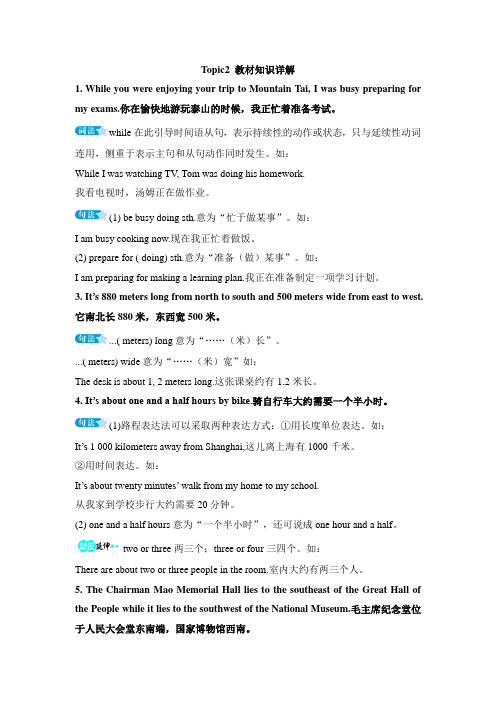
Topic2 教材知识详解1.While you were enjoying your trip to Mountain Tai, I was busy preparing for my exams.你在愉快地游玩泰山的时候,我正忙着准备考试。
while在此引导时间语从句,表示持续性的动作或状态,只与延续性动词连用,侧重于表示主句和从句动作同时发生。
如:While I was watching TV, Tom was doing his homework.我看电视时,汤姆正在做作业。
(1) be busy doing sth.意为“忙于做某事”。
如:I am busy cooking now.现在我正忙着做饭。
(2) prepare for ( doing) sth.意为“准备(做)某事”。
如:I am preparing for making a learning plan.我正在准备制定一项学习计划。
3. It’s 880 meters long from north to south and 500 meters wide from east to west.它南北长880米,东西宽500米。
...( meters) long意为“……(米)长”。
...( meters) wide意为“……(米)宽”如:The desk is about 1, 2 meters long.这张课桌约有1.2米长。
4.It’s about one and a half hours by bike.骑自行车大约需要一个半小时。
(1)路程表达法可以采取两种表达方式:①用长度单位表达。
如:It’s 1 000 kilometers away from Shanghai,这儿离上海有1000千米。
②用时间表达。
如:It’s about twenty minutes’ walk from my home to my school.从我家到学校步行大约需要20分钟。
最新仁爱版八年级英语下册各单元知识点梳理汇总(全册-经典-共12页),推荐文档(2021年整理)
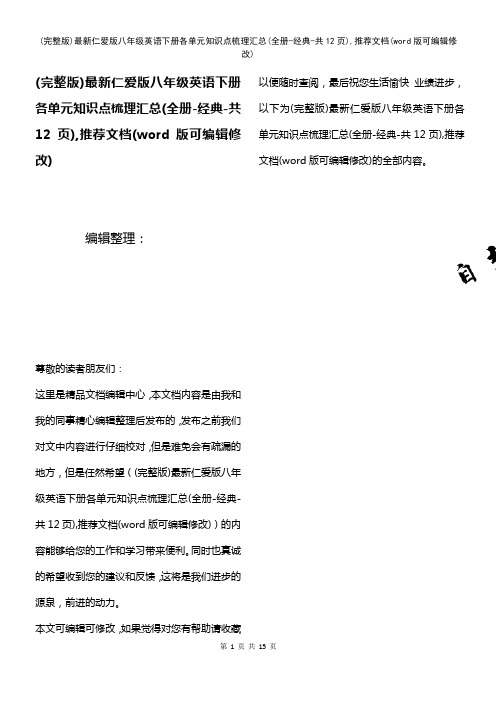
(完整版)最新仁爱版八年级英语下册各单元知识点梳理汇总(全册-经典-共12页),推荐文档(word版可编辑修改)编辑整理:尊敬的读者朋友们:这里是精品文档编辑中心,本文档内容是由我和我的同事精心编辑整理后发布的,发布之前我们对文中内容进行仔细校对,但是难免会有疏漏的地方,但是任然希望((完整版)最新仁爱版八年级英语下册各单元知识点梳理汇总(全册-经典-共12页),推荐文档(word版可编辑修改))的内容能够给您的工作和学习带来便利。
同时也真诚的希望收到您的建议和反馈,这将是我们进步的源泉,前进的动力。
本文可编辑可修改,如果觉得对您有帮助请收藏以便随时查阅,最后祝您生活愉快业绩进步,以下为(完整版)最新仁爱版八年级英语下册各单元知识点梳理汇总(全册-经典-共12页),推荐文档(word版可编辑修改)的全部内容。
Unit 5 Topic 1 You look excited【重点词组】1. invite sb。
to do sth。
邀请某人做某事2.one of +形容词最高级+ 名词复数3。
say thanks/hello/sorry/good—bye to sb.向某人致谢/问好/道歉/告别4。
feel/taste/smell/look/sound/seem +adj.5。
seem to do sth。
seem+adj.it seems that+从句7。
a ticket for/to sth.一张……的票8. lonely adj.孤独的alone adj./adv。
独自的,一个人的9. because of+n。
/pron/v-ing10。
cheer sb. up使某人振作起来11。
care for =take care of = look after 照顾12。
come into being 形成,产生13。
be full of = be filled with充满……14。
仁爱版八年级英语下册说课稿:Unit7Topic3SectionD
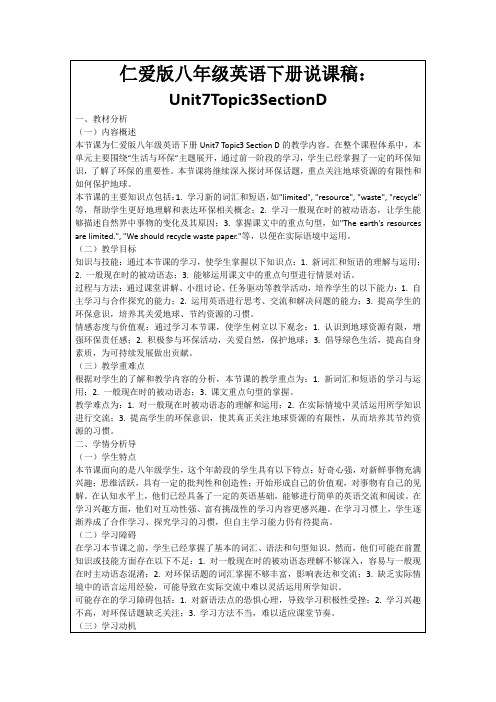
四、教学过程设计
(一)导入新课
为了快速吸引学生的注意力和兴趣,我将采用以下方式进行新课导入:
1.播放一段关于地球资源现状的短片,让学生直观地了解地球资源的有限性,引发他们对环保话题的关注。
2.短片结束后,提出问题:“What do you think of the video? Do you think it's important to protect our earth?”引导学生思考并展开讨论。
仁爱版八年级英语下册说课稿:Unit7Topic3SectionD
一、教材分析
(一)内容概述
本节课为仁爱版八年级英语下册Unit7 Topic3 Section D的教学内容。在整个课程体系中,本单元主要围绕“生活与环保”主题展开,通过前一阶段的学习,学生已经掌握了一定的环保知识,了解了环保的重要性。本节课将继续深入探讨环保话题,重点关注地球资源的有限性和如何保护地球。
本节课的主要知识点包括:1.学习新的词汇和短语,如"limited", "resource", "waste", "recycle"等,帮助学生更好地理解和表达环保相关概念;2.学习一般现在时的被动语态,让学生能够描述自然界中事物的变化及其原因;3.掌握课文中的重点句型,如"The earth's resources are limited.", "We should recycle waste paper."等,以便在实际语境中运用。
可能存在的学习障碍包括:1.对新语法点的恐惧心理,导致学习积极性受挫;2.学习兴趣不高,对环保话题缺乏关注;3.学习方法不当,难以适应课堂节奏。
仁爱版英语八年级下册Unit6 Topic3 教材知识详解
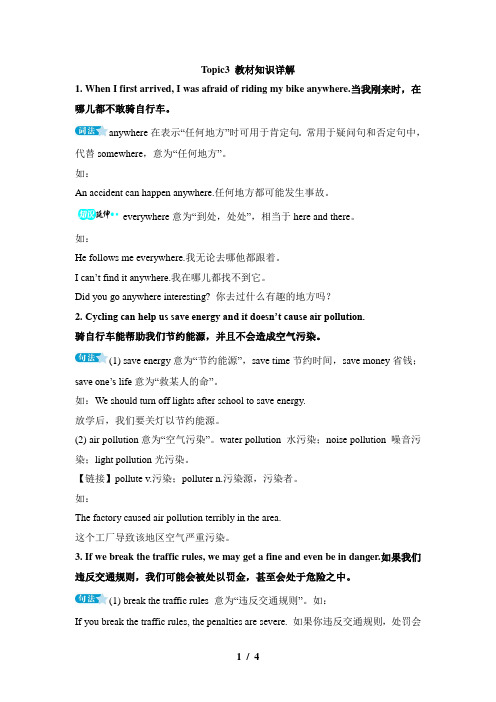
Topic3 教材知识详解1. When I first arrived, I was afraid of riding my bike anywhere.当我刚来时,在哪儿都不敢骑自行车。
anywhere在表示“任何地方”时可用于肯定句。
常用于疑问句和否定句中,代替somewhere,意为“任何地方”。
如:An accident can happen anywhere.任何地方都可能发生事故。
everywhere意为“到处,处处”,相当于here and there。
如:He follows me everywhere.我无论去哪他都跟着。
I can’t find it anywhere.我在哪儿都找不到它。
Did you go anywhere interesting? 你去过什么有趣的地方吗?2.Cycling can help us save energy and it doesn’t cause air pollution.骑自行车能帮助我们节约能源,并且不会造成空气污染。
(1) save energy意为“节约能源”,save time节约时间,save money省钱;save one’s life意为“救某人的命”。
如:We should turn off lights after school to save energy.放学后,我们要关灯以节约能源。
(2) air pollution意为“空气污染”。
water pollution 水污染;noise pollution 噪音污染;light pollution光污染。
【链接】pollute v.污染;polluter n.污染源,污染者。
如:The factory caused air pollution terribly in the area.这个工厂导致该地区空气严重污染。
3. If we break the traffic rules, we may get a fine and even be in danger.如果我们违反交通规则,我们可能会被处以罚金,甚至会处于危险之中。
★2018仁爱版八年级下册知识点讲解(一)
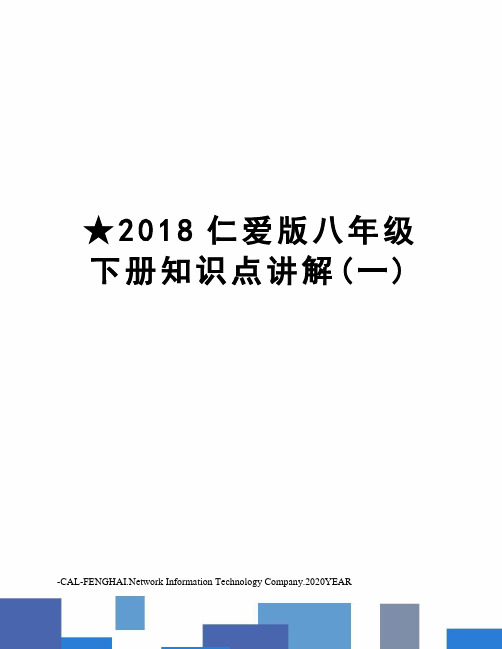
★2018仁爱版八年级下册知识点讲解(一)work Information Technology Company.2020YEAR仁爱版八年级下册知识点讲解(一)2018.4.15.应掌握的语法知识(一):时间状语从句和条件状语从句中,将来动作要用一般现在时表示(不能用将来时),但主句时态该用什么时态就用什么时态。
1. 以when,before,after,as soon as,until/till,while,as等引导的是时间状语从句;2.以if,unless等引导的是条件状语从句。
3.例如:4.I'll tell her the good news when she comes back.当她回来的时候,我将把这个好消息告诉她。
(不能说:...she will come...)5.If it doesn't rain, he will come here on time.如果不下雨,他会按时来这儿的。
(不能说:If It will not rain,...)6.以下三种情况通常表明从句是将来动作:7.一、主句是一般将来时:如:8. When I grow up, I’ll be a nurse and look after patients. 我长大后要当一名护士,照顾病人。
(不能说:When I will grow up,...)9.二、主句是祈使句:如:10.D on’t laugh at me when I make a mistake. (不能说:...when I will make ...)11.我犯错误的时候不要笑话我。
12.三、主句含有情态动词:如:13.Y ou should be quiet when you are in the reading room. (不能说:...when you will be in the ...)14.在阅览室时应保持安静。
- 1、下载文档前请自行甄别文档内容的完整性,平台不提供额外的编辑、内容补充、找答案等附加服务。
- 2、"仅部分预览"的文档,不可在线预览部分如存在完整性等问题,可反馈申请退款(可完整预览的文档不适用该条件!)。
- 3、如文档侵犯您的权益,请联系客服反馈,我们会尽快为您处理(人工客服工作时间:9:00-18:30)。
八年级下册Unit 5 Topic 1Section A1. How are you doing ? = How are you ?2. My father and mother want to invite your parents to go to the movies.invite sb. to do sth. 邀请某人去做某事3. My mom will prepare delicious food for us.(1) prepare sth. for sb. 为某人准备某物:He prepared some presents for you.(2) prepare for ( doing ) sth. 为(做)某事而准备:Iam preparing for my exam.4. I went to buy tickets, but there was none left.none表示(三个或三个以上中)没有一个可与of 连用,None 可以回答How many引导的问句; no one = nobody(没有一个人)常只指人,不能与of 连用,常用来回答Who引导的问句。
5. lonely 孤独的;alone 单独的;单独地。
如:He lives alone, and he sometimes feels lonely. Section B1. He feels disappointed because he can’t get a ticket to The Sound of Music.to 可表“对应”,如:(1) the answer to the question问题的答案(2)the key to the lock 锁的钥匙(3)the ticket to the concert 演唱会的票2. be proud of = take pride in 以…而骄傲I am proud of my country.3. seem(看起来,似乎)的用法:(1)seem + 形容词:They seem worried.(2) seem to do sth. 如:He seems to know the truth.(3) seem + that从句,如:It seems that he knows the truth.4. be pleased/ satisfied with 对…感到满意Iam pleased with your results.5. Kangkang, are you setting the table for your friends ?set the table 摆放餐桌6. Michael isn’t able to come.be able to 常可和can 退换使用,都可以表“能”。
7. I hope everything goes well. 我希望一切进展顺利。
8. 给某人打电话的常用表达方法有:①ring/ call/ phone sb;②ring/ call sb up;③give sb. a ring/call;Section C1. Maria taught the children to sing lively songs to cheer themselves up.(1) cheer up 使…振奋/高兴起来:Our teachers cheer us up in class every day.(2) cheer on 为…加油,欢呼:Would you like to come and cheer us on.2. What…for ? 和Why相近,前者侧重提问目的,后者侧重提问原因。
回答前者常用含for 短语表目的;而回答后者须用because 表原因。
如:(1) What did he come here for ?---- He came here for his bike.(2) Why did he come here ?----- Because he want to see you.3. When and where will the movie be on ?be on 在经行,在放映:The movie is on.4. Jack and Rose fell into the sea with many other people .fall into 掉进,落入(into有“进入”的意思,如:jump into 跳入)Section D1. It came into being after 1790.come into being 诞生,形成:The CPC Party came into being in 1921.2. It’s full of famous stories.be full of = be filled with 装满,充满3. This kind of opera is very popular with Chinese people.be popular with 受…的欢迎:Yao Ming is popular with Chinese people.4. 语法:系动词+形容词(作表语)联系动词有五类:(1)表示“是”的be (am, is, are , was, were, been)(2) 表示保持一种状态的:keep, stay.(3) 表示“变”的:become, get, turn, go, grow.(4) 表示“看起来”的:look, seem, appear.(5) 表示与其它感官有关的:smell(闻起来),taste(尝起来),sound (听起来),feel (摸起来)八年级下册Unit 5 Topic 2Section A1. She is very strict with herself.(1) be strict with sb. 对某人要求严格:Our teacher is strict with us.(2) be strict in sth. 对某事要求严格:My teacher is strict in his work.2. I think I should have a talk with her.have a talk with sb. = talk with sb. 和某人交谈3. Take it easy. 别着急,别紧张。
Section B1. I’m feeling very sad because I failed the English exam.(1) fail the exam = don’t pass the exam 考试不及格(2) fail to do sth.做某事失败:Ifailed to pass the exam.2. Everyone gets these feelings at your age.(1) at one’s age 在某人的这个年龄阶段:Your father began to work at your age.(2) at the age of 在…岁时:At the age of seven, he could swim.3. 使令动词(make, let, have)的用法:make/ let / have sb do sth. 使某人做某事但have sth done 让某人干某事(自己不做),比较:①I have my son go instead (我让我儿子代去)②I had the machine repaired (让人修好了机器)get也可表“使,让”,但它后常接动词不定式:He got me to wash the car.4. 短语:in one’s teens 在某人十几岁时;in one’s twenties 在某人二十几岁时,in one’s thirties 在某人三十几岁时,in one’s forties在某人四十几岁时Section C1. How time flies! 光阴似箭2. What’s more 此外,而且:What’s more, it seems that my classmates don’t accept me.3. The girl is afraid of speaking in public.be afraid of (doing) sth.害怕(做)某事: I am afraid of dogs.Section D1. He refused to play soccer or go to the movies with his friends.refuse to do sth. 拒绝去做某事(refuse的反义词为accept)2. (1) instead 表“代替”,副词,后不接词,常放在句末或句首,如:If you are busy, you can come another day instead.(2) instead of 表“代替”,介词短语,后接词(被代替的内容),常放句中(谓语动词后),但不能做谓语,如:We eat rice instead of beef.(3) take the place of 表“代替”,动词短语,常放句中作谓语动词。
如:He took the place of me to finish the work.3. be angry with sb. 生某人的气;be angry at sth. 因某事而生气。
八年级下册Unit 5 Topic 3Section A1. Michael, I am sorry about your illness, but it can’t be SARS.must be 一定是;may be/ can be 可能是;can’t be 不可能是2. Follow the doctor’s advice, and you will get well soon.(1) follow one’s advice 遵循某人的建议(2) get well 恢复健康3. I missed a lot of lessons.miss lessons 意为“缺课”,miss 的意思有:(1)错过,如: I missed the early bus.(2)想念: I miss you very much.4. I’m worried about the test at the end of the month.(1) at the end of 在…的最后:You will find the post office at the end of the road.(2) by the end of 不迟于:I will finish my work by the end of this month.5. We can take turns to help you with your lessons.take turns to do sth.轮流去做某事:We take turns to clean the classroom.6. You can study by yourself. 你可以自学study/ learn (sth) by oneself = teach oneself (sth.) 自学…如:I learn English by myself. = I teach myself English.Section B1. If we are usually in a good mood, we may become healthier.be in a good / bad mood 处于好/坏心情;be in good health 很健康2. When someone is ill, he or she should try to smile at life.smile at life 笑对人生3. We can put on a short play.put on (1) 穿上:put on your shoes. (2) 上演:Put on a play.4. on the way home, you meet a big dog.On the/ one’s way (to)+ 地点:(在去某地的路上)当地点是副词(如home),不用to.5. Your mother get along well with her workmates.get along (well) with 与…相处好:I get along with my classmates.Section C1. 易混淆的几个词:sometimes 有时;sometime将来的某个时候;some times 几次;some time 一些时间2. When it rains, I often have unhappy thoughts.thought (1)名词,想法;主意。
